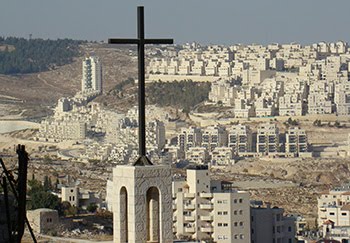Maalul, June 8, 2013
 |
Across the valley, in what was once the Palestinian village of Safuriya, renamed Tzipori by the Jews who moved in after the conquest of 1948, two Franciscan friars are renovating the dilapidated Crusader chapel of Qadissa Hanna, where they now say mass every Sunday. They hope to mend the roof to let a congregation regularly attend.
In the Arab village of al-Bassa on Israel’s Mediterranean coast near the border with Lebanon, Wakim Wakim, a lawyer, has christened his children, Musa and Aden, the first baptisms there for six decades. The Archbishop of All Galilee, a Melkite Greek Catholic, has finally managed to register and thereby reclaim his church, where the farmers of Shlomi, a Jewish town founded in 1950 on the ruins of al-Bassa, had stabled their goats. Catholics from the destroyed village of Ikrith, near the Lebanese border, have renovated their church, and continue to bury their dead in the cemetery.
Muslims complain that Israel’s 125,000 Christian Arabs find it much easier to recover their holy places. Israel let the patriarchs stay after 1948, safeguarding their assets from new laws licensing the confiscation of property of “absentees” living in “enemy territory”. But it confiscated Muslim religious endowments, arguing that they fell under the auspices of the chief mufti based in East Jerusalem, then under Jordan’s enemy rule. Rolly Rosen, an Israeli expert on inter-communal relations, says Israelis find Christian Arabs less of a threat. “They are smaller in number and have Western backing,” she says.
The army, which took much of Maalul’s land including its Christian cemetery for a military base, has let Christians renovate churches and pray in them, but has prevented Muslims doing likewise with mosques. “It’s a policy of divide-and-rule,” says Rawan Bisharat, a Christian in Maalul. Banned from their mosque, some Muslims join the Easter service instead.
